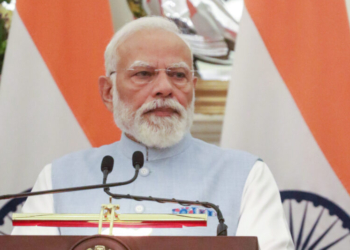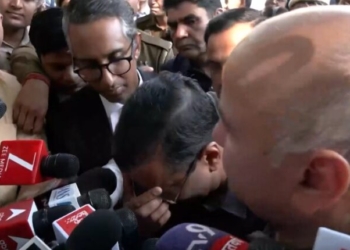New Delhi: Top defence experts in the country have backed the Centre’s strong retaliatory measures against Pakistan following the dastardly terror attack in Jammu and Kashmir’s Pahalgam.
Twenty-six tourists, hailing from different parts of the country and one from Nepal, were brutally killed in Baisaran, dubbed ‘mini Switzerland’ in Pahalgam, on April 22. The men were singled out for their religion and shot point-blank. The women and children were spared with the message that they must convey the horror to the government.
In response to the attack, the government announced strong measures against Pakistan, which have received praise from defence experts, including a retired Major General, a retired Colonel, and a former BSF officer.
The steps India took are: suspension of the Indus Waters Treaty, closing the Integrated Check Post at the Attari border, and reducing diplomatic presence in each other’s high commissions.
P.K. Mishra, Defence Expert and former Additional Director General of the Border Security Force (BSF), while speaking to IANS, applauded the Modi government’s firm stance.
“The steps taken by the PM Modi government are commendable. The suspension of the Indus Waters Treaty, where a 1:5 water-sharing ratio was in place, is a major move. With this treaty shut, Pakistan will feel the impact, may potentially face famine,” he said.
“Closing the Attari-Wagah border is another welcome step. It limits access to India and sends a strong message. Cancelling visas is also the right decision. Many Pakistanis are returning to their country through the Attari border. Reducing embassy staff is a wise move, too. I congratulate PM Modi for sending a clear message to Pakistan.”
Retired Colonel T.P. Tyagi echoed similar sentiments. He said, “Back in 1960, under the Indus Waters Treaty, we had already demonstrated our leverage, and Pakistan was suffering from water scarcity even then. The current suspension reasserts that power,” he stated.
“Those who came through the Attari border, even for medical reasons, are now being told to return within an hour, regardless of their condition. People-to-people contacts, which allowed Pakistani journalists and businessmen into India, have also been cut short. They’ve been given a 48-hour deadline to leave. All these are effective actions. However, unless we undertake military action, like neutralising terror launch pads in Pak-occupied Kashmir (PoK) using standoff capabilities, such as Apache helicopters or long-range artillery. I’m not calling for a declaration of war, but a targeted response is necessary to demonstrate strength.”
Major General (Retd.) Dhruv C. Katoch, Director of the India Foundation, emphasised the strategic and symbolic weight of the measures announced.
“The five points outlined by the Foreign Secretary focus on three key areas — suspension of the Indus Treaty, curtailment of people-to-people contact, and expulsion of military observers. These are strong and significant steps to convey our intent,” he said.
“The message is clear: India’s actions will mirror Pakistan’s behaviour. If terrorism continues, we will escalate our response. By suspending the Indus Treaty, India is forcing Pakistan to reconsider its actions. Reducing civilian interactions also sends a strong message: terror and diplomacy cannot coexist. The Modi government is asserting India’s right to protect itself, and it’s about time that Pakistan is held accountable for consistently betraying peace efforts. There is a growing realisation that Pakistan is acting as a terror state. Much like Israel’s approach to Hamas, we are signalling that enough is enough.”
Meanwhile, the coordinated policy decisions were announced on Wednesday following a Cabinet Committee on Security (CCS) meeting chaired by Prime Minister Narendra Modi, who cut short his Saudi Arabia visit after the attack in Pahalgam.
According to an official statement, the Indus Waters Treaty of 1960 will be held in abeyance immediately until Pakistan “credibly and irrevocably abjures” support for cross-border terrorism.
Additionally, the Integrated Check Post at Attari has been closed. Individuals who crossed into India through this post with valid documentation must return before May 1, 2025. Furthermore, Pakistani nationals will no longer be permitted to travel to India under the SAARC Visa Exemption Scheme. Existing visas under this scheme have been revoked, and holders currently in India have been given 48 hours to leave.
The Indian government also declared the Defence, Naval, and Air Advisors in the Pakistani High Commission as persona non grata. They have one week to exit the country. In reciprocity, India will withdraw its own military advisors from the High Commission in Islamabad. Five support staff for these advisors will also be withdrawn from both countries’ diplomatic missions.
Lastly, the total diplomatic staff strength at both High Commissions will be reduced from 55 to 30 by May 1, 2025, signalling a significant scaling down of bilateral engagement.
(IANS)
















